Key takeaways:
- Live sound engineers enhance performances through technical expertise, quick problem-solving skills, and adaptability to real-time challenges.
- The crucial relationship between sound engineers and performers fosters collaboration, allowing for a personalized auditory experience that resonates with audiences.
- Staying calm under pressure and maintaining clear communication are vital skills that enable sound engineers to navigate unpredictable situations and uphold the quality of live events.
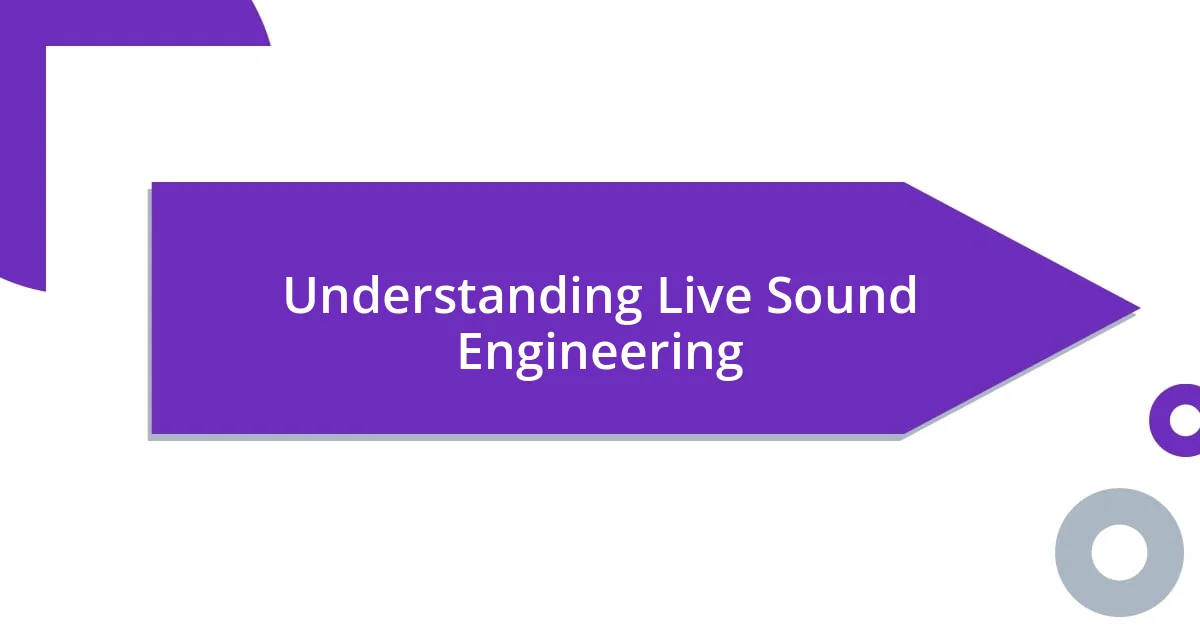
Understanding Live Sound Engineering
Live sound engineering is all about creating an auditory experience that enhances performances, whether it’s a band at a festival or a speaker at a corporate event. I once attended a concert where the sound engineer was practically a wizard, seamlessly balancing the vocals and instruments. It made me wonder: how do they manage so many variables in real-time?
Understanding the nuances of live sound engineering means appreciating the intricate dance between technology and artistry. I remember a time when I was in the mixing booth, and we had issues with feedback. The pressure was palpable, and I learned firsthand how crucial a sound engineer’s quick thinking is in salvaging a moment that could easily have gone awry. Doesn’t it make you appreciate the behind-the-scenes heroes a bit more?
Consider this: live sound engineers need an ear for detail and the ability to adapt quickly. I often find myself reflecting on how much a subtle adjustment to a microphone’s gain can transform the entire atmosphere of a performance. Have you ever noticed how different a show feels when the sound is just right compared to when it isn’t? It’s fascinating how the skill and intuition of a sound engineer can make or break a live experience.
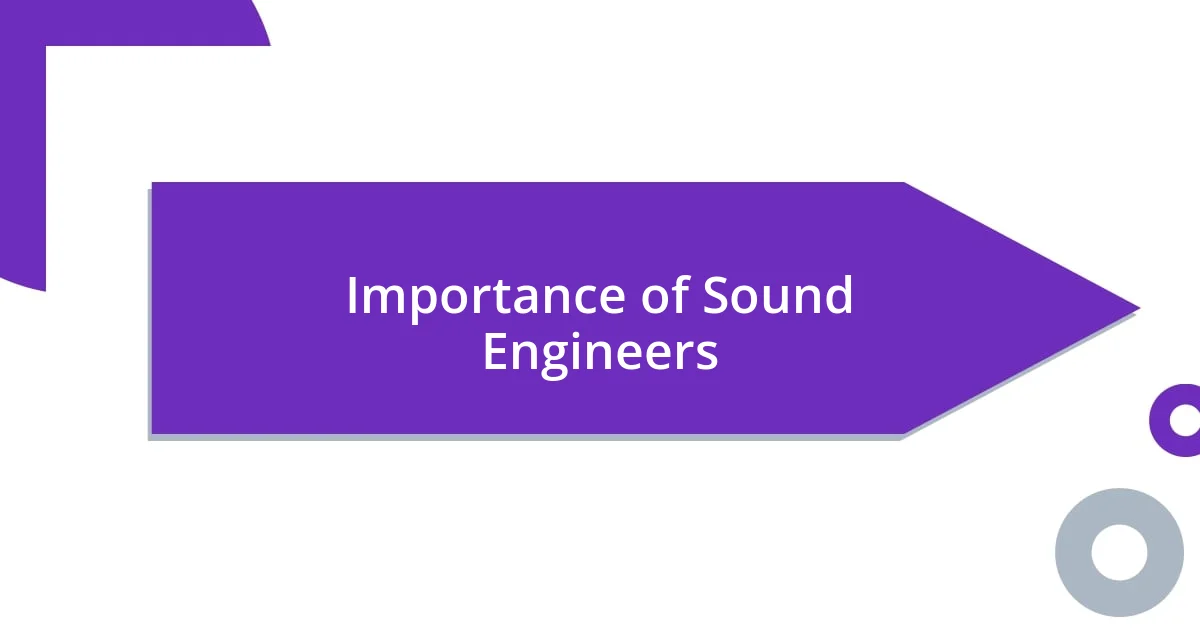
Importance of Sound Engineers
Sound engineers play a pivotal role in shaping the auditory experience at any live event. I remember a local gig where the sound seemed off at first. After a quick adjustment by the engineer, the band sounded incredible, and the audience’s response transformed instantly. It’s incredible how their expertise can elevate a performance from ordinary to extraordinary.
Their importance extends beyond just adjusting levels and mixing sound. During a theater production I attended, there was an unexpected technical glitch. The sound engineer swooped in, resolving the issue with what seemed like magical ease. This experience made me realize that their ability to remain calm under pressure can save the day and greatly enhance the overall performance.
Moreover, the relationship between a performer and a sound engineer is quite special. At an open mic night, I saw how the engineer worked closely with each artist, fine-tuning their sound to highlight their unique style. This collaboration is what makes live performances feel so personalized and engaging. Does that make you think about how much thought goes into what we hear at events?
| Role of Sound Engineers | Impact on Performance |
|---|---|
| Technical Wizardry | Transforms audio experience |
| Problem-Solving | Resolves glitches efficiently |
| Collaboration | Enhances artist’s voice |
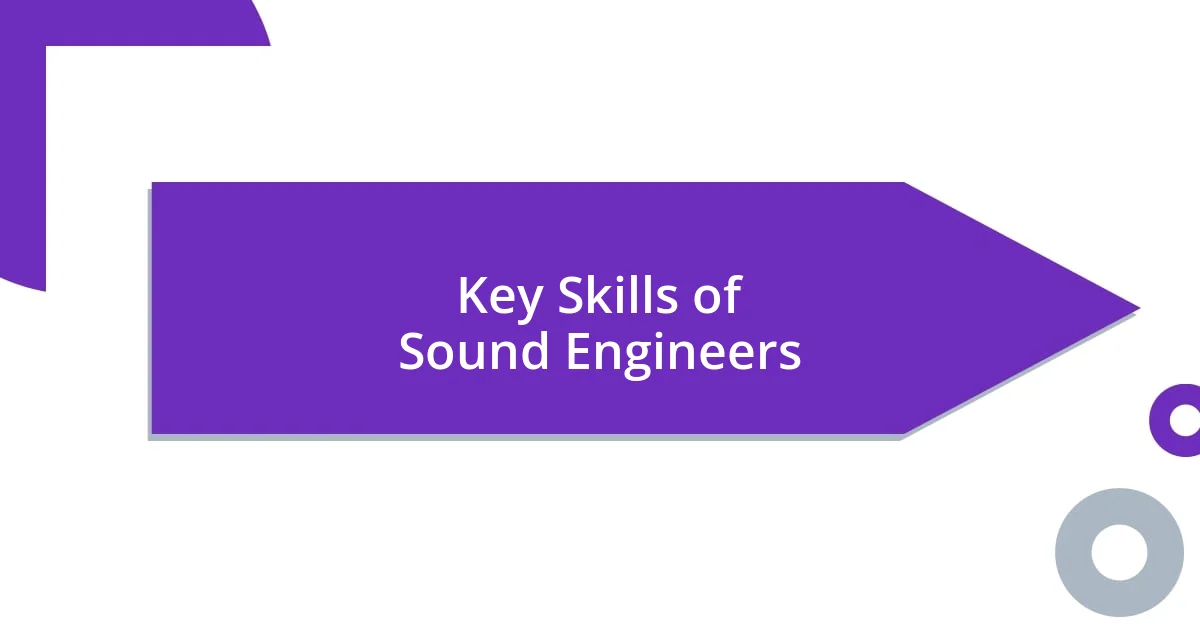
Key Skills of Sound Engineers
When I think about the key skills of sound engineers, one major quality stands out: their keen auditory perception. It’s not just about hearing; it’s about actively listening to the nuances of music and dialogue, detecting issues that may slip past the average ear. I vividly recall a night at a bustling festival; the sound engineer caught a slight distortion during a band’s set. A quick tweak, and suddenly the music soared again. It’s such an impressive skill, transforming potential disasters into seamless performances.
Here are some essential skills that make sound engineers truly exceptional:
- Auditory Perception: Sharp hearing to detect every subtle change in sound.
- Technical Proficiency: Mastery of audio equipment and software.
- Quick Problem-Solving: Ability to troubleshoot and resolve issues rapidly during live events.
- Communication: Clear collaboration with artists and other team members.
- Adaptability: Flexibility to adjust to varying performance environments and unexpected challenges.
Another skill that I’ve seen in action time and again is the art of communication. There’s a delicate balance between the performer’s vision and the sound engineer’s execution. I once noticed how the sound engineer at an indie show would nod and smile at the vocalist, gauging their energy and style while making real-time adjustments. It reminded me of a dance—one where trust is essential. That synergy not only ensures the sound quality is top-notch but also deeply influences the overall atmosphere of the performance.
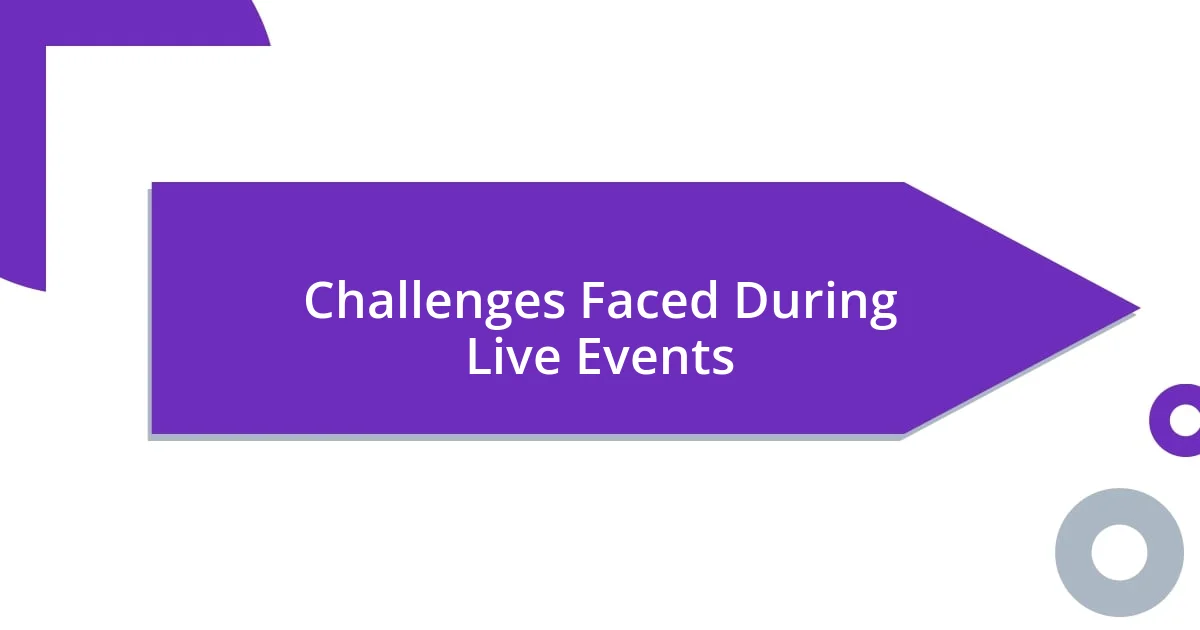
Challenges Faced During Live Events
When it comes to live events, one challenge that often lurks in the background is the unpredictability of the venue’s acoustics. I remember attending an outdoor concert where the wind picked up and carried the sound away from the audience. The sound engineer scrambled to adjust the microphones, but you could see the worry in their expression. It’s moments like that where their expertise truly shines, as they have to think on their feet to ensure everyone can enjoy the performance.
Another complicating factor is the lure of technical failures. At a charity gala I attended, the sound system suddenly cut off mid-speech. The sound engineer remained cool while quickly troubleshooting the issue. I could sense the tension in the room, and their ability to maintain composure helped soothe the audience. Have you ever had a moment like that, where everything seems to teeter on the edge? It’s a reminder of just how critical their role is in salvaging not just sound but the event’s atmosphere.
Perhaps the greatest challenge is the differing expectations from performers and audiences alike. I recall a local band that wanted an echo effect added to their sound, while the audience craved clarity. The sound engineer became the mediator in this battle of desires, adjusting levels and mixing until both parties were satisfied. Can you imagine trying to balance so many conflicting needs? It’s a testament to their skill that they can create a harmonious experience amidst chaos; that’s what truly defines a great sound engineer.
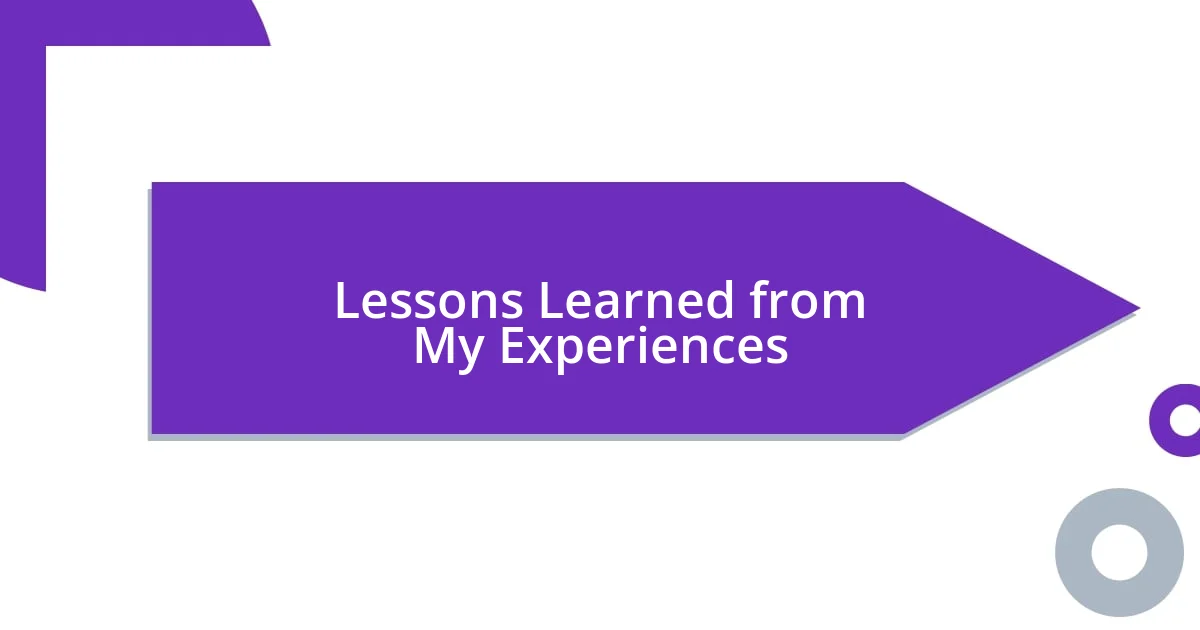
Lessons Learned from My Experiences
One of the key lessons I’ve learned through my experiences with live sound engineers is the importance of staying calm under pressure. I remember a particularly chaotic night at a large venue where the headliner’s tech unexpectedly failed. Instead of panicking, the sound engineer took a deep breath and calmly communicated with the team, coordinating a solution that had the show back on track in minutes. It’s fascinating how their composure can turn a potential disaster into a success story. Have you ever seen someone handle chaos with grace? It’s truly inspiring.
I’ve also come to appreciate the critical role of adaptability in live sound situations. I recall a quick setup at a last-minute gig where they had to switch out equipment on the fly due to compatibility issues. Watching the engineer pivot so effortlessly, moving from one task to another without a hitch, taught me that flexibility isn’t just a skill—it’s a necessity. How often do we encounter something unexpected that throws us off our game? These professionals remind us that adjusting our approach can lead to remarkably creative outcomes.
Lastly, witnessing the bond that forms between sound engineers and performers has opened my eyes to the significance of trust in collaboration. At a recent showcase, I watched as the engineer and the band huddled together, exchanging ideas that shaped the performance. That synergy between artists leads to magic on stage! Have you ever felt that connection in a live setting? It’s amazing how a few well-timed adjustments can elevate the entire experience and leave lasting impressions on the audience.














